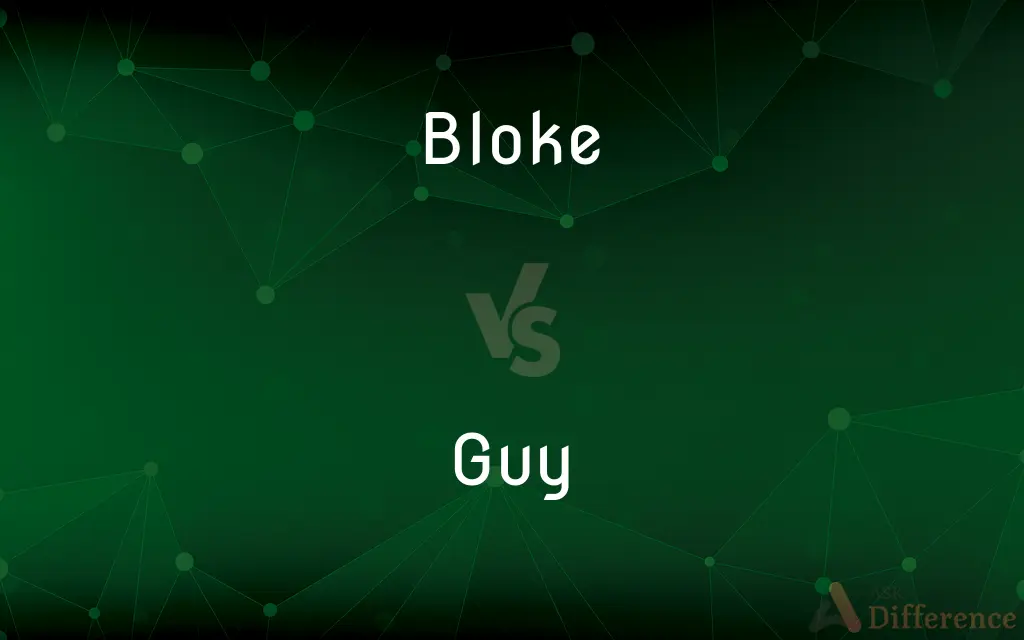Bloke vs. Guy — What's the Difference?
By Fiza Rafique & Urooj Arif — Updated on May 2, 2024
Bloke and guy both refer to a man, but "bloke" is informal British English, used more commonly in the UK, whereas "guy" is widely used in American English and recognized globally.

Difference Between Bloke and Guy
Table of Contents
ADVERTISEMENT
Key Differences
Bloke is a colloquial term predominantly used in the UK and other Commonwealth countries to refer to a man, often conveying a sense of familiarity and casualness. On the other hand, guy is a more universally recognized term used primarily in American English but understood and used globally to refer to any male, regardless of age or relationship.
Bloke often carries a slightly old-fashioned or endearing tone, particularly in British contexts, implying a regular, unpretentious man. Whereas, guy is a more neutral term that can be used for males of any age or social standing, making it versatile in both casual and slightly formal contexts.
The usage of bloke is more localized, primarily found in spoken language and less often in written form outside of direct dialogue or character-driven writing. On the other hand, guy is prevalent in both spoken and written American English, used in everyday conversation, media, and literature.
In terms of connotation, bloke can sometimes suggest a stronger cultural identity, particularly linked to British or Australian masculinity. Conversely, guy lacks specific cultural connotations and is often seen as a generic term for any male person.
While bloke is almost exclusively used to refer to men, the term guy can be applied more broadly, including young males and, in plural form (guys), can even refer to mixed-gender groups, showing its flexibility in usage.
ADVERTISEMENT
Comparison Chart
Geographic Usage
Predominantly UK and Commonwealth
Global, especially in the United States
Connotation
Casual, slightly old-fashioned
Neutral, versatile
Age Connotation
Generally adult men
All ages, including young males
Usage in Language
Mostly spoken, less common in formal writing
Common in both spoken and written forms
Cultural Identity
Strongly linked to British/Australian masculinity
Lacks specific cultural connotations
Compare with Definitions
Bloke
Often implies familiarity and warmth.
That bloke over there is my brother-in-law.
Guy
A common term for a male person, used globally.
There's a guy in my class from Brazil.
Bloke
A British informal term for a man.
I met a friendly bloke at the pub.
Guy
Used in both singular and plural forms to address mixed groups.
Hey guys, are we ready to go?
Bloke
Suggests an adult male with a laid-back personality.
The bloke at the store was very helpful.
Guy
Can refer to males of any age group.
That little guy is only eight years old.
Bloke
Used to describe a regular, ordinary man.
He's a good bloke, always ready to help.
Guy
Neutral in terms of formality and setting.
The guy at the reception desk will help you.
Bloke
Primarily used in informal settings.
There's a bloke I know who can fix that.
Guy
Frequently appears in American media and conversations.
You know that guy from the movie last night?
Bloke
Bloke is a slang term for a common man in the United Kingdom, Ireland, Australia, New Zealand and South Africa. The earliest known usage is from the early 19th century, when it was recorded as a London slang term.
Guy
A figure representing Guy Fawkes, burnt on a bonfire on Guy Fawkes Night, and often displayed by children begging for money for fireworks.
Bloke
A fellow; a man.
Guy
A man
He's a nice guy
Bloke
(Australia) An exemplar of a certain masculine, independent male archetype.
Guy
A rope or line fixed to the ground to secure a tent or other structure.
Bloke
A fellow, a man; especially an ordinary man, a man on the street.
Guy
Make fun of; ridicule
She never stopped guying him about his weight
Bloke
(A lower deck term for) the captain or executive officer of a warship, especially one regarded as tough on discipline and punishment.
Guy
Secure with a guy or guys
It was set on concrete footings and guyed with steel cable
Bloke
An anglophone (English-speaking) man.
Guy
A rope, cord, or cable used to steady, guide, or secure something.
Bloke
A man who is (usually) old and/or eccentric
Guy
(Informal) A man; a fellow.
Guy
Chiefly British A person of odd or grotesque appearance or dress.
Guy
Often Guy An effigy of Guy Fawkes paraded through the streets of English towns and burned on Guy Fawkes Day.
Guy
To steady, guide, or secure with a rope, cord, or cable.
Guy
To hold up to ridicule; mock.
Guy
(British) An effigy of a man burned on a bonfire on the anniversary of the Gunpowder Plot (5th November).
Guy
(dated) A person of eccentric appearance or dress; a "fright".
Guy
(colloquial) A man, fellow.
Guy
A person see usage notes.
Guy
Character, personality (not referring to a person, but pretending to)
The dog's left foreleg was broken, poor little guy.
This guy, here, controls the current, and this guy, here, measures the voltage.
This guy is the partial derivative of that guy with respect to x.
Guy
Buster, Mack, fella, bud, man.
Hey, guy, give a man a break, would ya?
Guy
A guide; a leader or conductor.
Guy
A support rope or cable used to aid in hoisting or lowering.
Guy
A support to secure or steady structures prone to shift their position or be carried away (e.g. the mast of a ship or a suspension bridge).
Guy
(intransitive) To exhibit an effigy of Guy Fawkes around the 5th November.
Guy
(transitive) To make fun of, to ridicule with wit or innuendo.
Guy
To play in a comedic manner.
Guy
To equip with a support cable.
Guy
A rope, chain, or rod attached to anything to steady it; as: a rope to steady or guide an object which is being hoisted or lowered; a rope which holds in place the end of a boom, spar, or yard in a ship; a chain or wire rope connecting a suspension bridge with the land on either side to prevent lateral swaying; a rod or rope attached to the top of a structure, as of a derrick, and extending obliquely to the ground, where it is fastened.
Guy
A grotesque effigy, like that of Guy Fawkes, dressed up in England on the fifth of November, the day of the Gunpowder Plot.
The lady . . . who dresses like a guy.
Guy
A person of queer looks or dress.
Guy
A man or young man; a fellow; - usually contrasted with gals or girls as, it was fun for both the guys and gals; the guys were watching football while the girls played bridge.
Guy
To steady or guide with a guy.
Guy
To fool; to baffle; to make (a person) an object of ridicule.
Guy
An informal term for a youth or man;
A nice guy
The guy's only doing it for some doll
Guy
An effigy of Guy Fawkes that is burned on a bonfire on Guy Fawkes Day
Guy
A rope or cable that is used to brace something (especially a tent)
Guy
Subject to laughter or ridicule;
The satirists ridiculed the plans for a new opera house
The students poked fun at the inexperienced teacher
His former students roasted the professor at his 60th birthday
Guy
Steady or support with with a guy wire or cable;
The Italians guyed the Tower of Pisa to prevent it from collapsing
Common Curiosities
Can "guy" be used to address a group of women?
In casual speech, "guys" can be used gender-neutrally to address a group, including groups of women.
Is "bloke" acceptable in formal writing?
Bloke is typically reserved for informal contexts and is less likely to appear in formal writing.
Can "guy" be used for children?
Yes, guy can be used to refer to young males and is not restricted to adults.
How does the usage of "bloke" differ in Australia compared to the UK?
In Australia, "bloke" also carries connotations of masculinity and ruggedness, similar to its use in the UK, but it may be more emblematic of the traditional Australian "Aussie" persona.
Is it acceptable to use "guy" in professional emails or communications?
While generally acceptable, the use of "guy" should be considered based on the tone and formality of the communication; more neutral terms might be preferred in very formal contexts.
What are some synonyms for "bloke" and "guy"?
Synonyms for "bloke" include chap, fellow, or lad in British English; for "guy," alternatives might be dude, fella, or man.
Are there feminine equivalents to "bloke" and "guy"?
There's no direct feminine equivalent to "bloke," but "gal" can sometimes serve as a counterpart to "guy."
Is "bloke" commonly used in American English?
Bloke is understood in American English but is rarely used compared to "guy."
Why might someone choose to use "bloke" over "guy"?
A speaker might choose "bloke" to convey a casual, friendly tone or to emphasize British cultural identity, especially in informal dialogue.
Do "bloke" and "guy" have equivalent terms in other languages?
Many languages have informal terms for "man" but direct equivalents that carry the same connotations as "bloke" or "guy" may vary; for instance, "tipo" in Italian or "Kerl" in German might be loosely comparable to "guy."
What contexts are inappropriate for using "bloke"?
Using "bloke" in formal or professional settings, especially outside the UK or Australia, may be inappropriate due to its casual and colloquial nature.
How has the use of "guy" evolved over time?
Historically, "guy" referred specifically to a man or boy, but its usage has broadened to include gender-neutral references, especially in the plural form to address groups.
What impact does regional dialect have on the use of "bloke"?
The use of "bloke" can signal a speaker's British or Australian identity, and it may be less familiar or carry different nuances in other English-speaking regions.
Are "bloke" and "guy" used differently in media representations?
In media, "bloke" is often used to depict a specifically British character type, while "guy" is a more universally applicable term in American and international contexts.
Can "guy" be used to refer to an unspecified individual?
Yes, "guy" can be used in a general sense for someone whose identity is unknown, not necessarily restricted to males.
Share Your Discovery

Previous Comparison
Weather vs. Weatherwise
Next Comparison
Punk vs. GrungeAuthor Spotlight
Written by
Fiza RafiqueFiza Rafique is a skilled content writer at AskDifference.com, where she meticulously refines and enhances written pieces. Drawing from her vast editorial expertise, Fiza ensures clarity, accuracy, and precision in every article. Passionate about language, she continually seeks to elevate the quality of content for readers worldwide.
Co-written by
Urooj ArifUrooj is a skilled content writer at Ask Difference, known for her exceptional ability to simplify complex topics into engaging and informative content. With a passion for research and a flair for clear, concise writing, she consistently delivers articles that resonate with our diverse audience.
















































